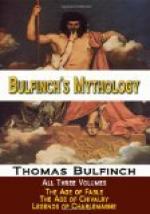Breuse had by this time returned, and the cries of Brengwain, renewed at seeing him, sufficiently showed the stranger the cause of the distress. Tristram spurred his horse towards Breuse, who, not unprepared, ran to the encounter. Breuse was unhorsed, and lay motionless, pretending to be dead; but when the stranger knight left him to attend to the distressed damsels, he mounted his horse, and made his escape.
The knight now approached Isoude, gently raised her head, drew aside the golden hair which covered her countenance, gazed thereon for an instant, uttered a cry, and fell back insensible. Brengwain came; her cares soon restored her mistress to life, and they then turned their attention to the fallen warrior. They raised his visor, and discovered the countenance of Sir Tristram. Isoude threw herself on the body of her lover, and bedewed his face with her tears. Their warmth revived the knight, and Tristram on awaking found himself in the arms of his dear Isoude.
It was the law of the Round Table that each knight after his admission should pass the next ten days in quest of adventures, during which time his companions might meet him in disguised armor and try their strength with him. Tristram had now been out seven days, and in that time had encountered many of the best knights of the Round Table, and acquitted himself with honor. During the remaining three days, Isoude remained at the abbey, under his protection, and then set out with her maidens, escorted by Sir Tristram, to rejoin King Mark at the court of Camelot.
This happy journey was one of the brightest epochs in the lives of Tristram and Isoude. He celebrated it by a lay upon the harp in a peculiar measure, to which the French give the name of Triolet.
“With fair Isoude, and
with love,
Ah! how sweet the life
I lead!
How blest for ever thus
to rove,
With fair Isoude, and
with love!
As she wills, I live
and move,
And cloudless days to
days succeed:
With fair Isoude, and
with love,
Ah! how sweet the life
I lead!
“Journeying on from
break of day,
Feel you not fatigued,
my fair?
Yon green turf invites
to play;
Journeying on from day
to day,
Ah! let us to that shade
away,
Were it but to slumber
there!
Journeying on from break
of day,
Feel you not fatigued,
my fair?”
They arrived at Camelot, where Sir Launcelot received them most cordially. Isoude was introduced to King Arthur and Queen Guenever, who welcomed her as a sister. As King Mark was held in arrest under the accusation of the two Cornish knights, Queen Isoude could not rejoin her husband, and Sir Launcelot placed his castle of La Joyeuse Garde at the disposal of his friends, who there took up their abode.
King Mark, who found himself obliged to confess the truth of the charge against him, or to clear himself by combat with his accusers, preferred the former, and King Arthur, as his crime had not been perpetrated, remitted the penalty, only enjoining upon him, under pain of his signal displeasure, to lay aside all thoughts of vengeance against his nephew. In the presence of the king and his court all parties were formally reconciled; Mark and his queen departed for their home, and Tristram remained at Arthur’s court.




